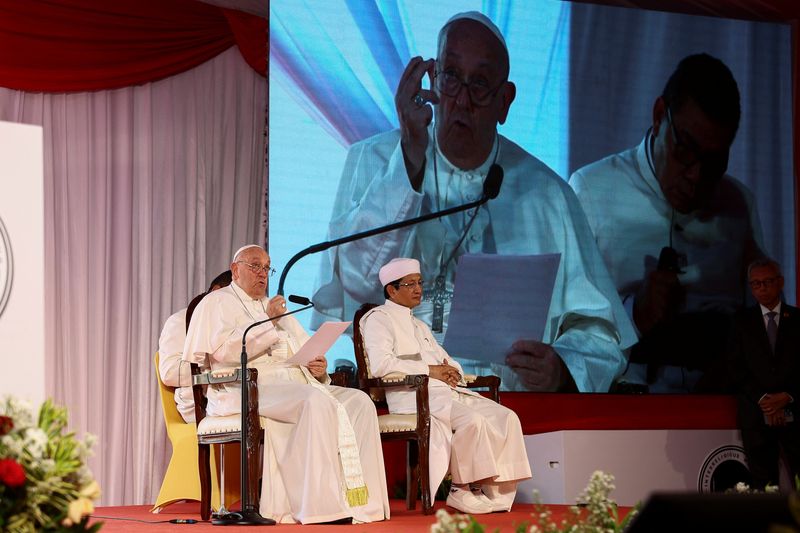Pope Francis says climate change a common cause during Istiqlal Mosque visit
2024.09.04 23:50
By Joshua McElwee
JAKARTA (Reuters) – Pope Francis on Thursday invited Muslims and Catholics to push global leaders to confront the dangers of climate change and extremism, and spoke of the common roots of different religious beliefs as he visited Southeast Asia’s largest mosque in Jakarta.
In a day laden with religious symbolism on his trip to Indonesia, the world’s most populous Muslim-majority country, the pope issued a joint declaration with the national grand imam and other local faith leaders that called for “decisive action” to address the warming planet.
“The human exploitation of creation, our common home, has contributed to climate change, leading to various destructive consequences such as natural disasters, global warming and unpredictable weather patterns,” read the declaration, formally signed by Francis and Grand Imam Nasaruddin Umar.
“We sincerely call on all people of good will to take decisive action in order to maintain the integrity of the natural environment and its resources,” they said.
The signing of the declaration came during Francis’ visit to Istiqlal Mosque, a domed structure covering some nine hectares (22 acres) in central Jakarta.
The pope is visiting Indonesia through Friday, as part of an ambitious 12-day journey to four countries across Southeast Asia and Oceania.
Francis also spoke to an inter-religious gathering held outside the mosque’s main entrance, which opened with a young woman offering a plaintive singing of a passage from the Koran.
The pope made repeated reference to a new underground tunnel connecting the mosque with the city’s Catholic cathedral, located across the street.
The 28 metre-long (90 feet) passageway, called the “tunnel of friendship”, is an “eloquent sign” indicating how people of different beliefs can share common roots, said the 87-year-old pope.
“We could say that what lies ‘underneath,’ what runs underground, like the ‘tunnel of friendship,’ is the one root common to all religious sensitivities: the quest for an encounter with the divine,” said Francis.
“By looking deeply … we discover that we are all brothers and sisters, all pilgrims, all on our way to God, beyond what differentiates us,” he said.
Chaturrini Widosari, a Muslim, was attending the inter-religious gathering with her Catholic friend, Connie Triastuti Anoy. Widosari called the pope a “role model” who gives an example of “how to live in the world in peace together even though we are different religions”.
About 87% of Indonesia’s population of 280 million is Muslim, while about 3% is Catholic.
Francis has emphasised Catholic-Muslim dialogue throughout his 11-year papacy and has signed several joint declarations with Muslim leaders.
In 2019, he was the first pope to visit the Arabian peninsula, where he signed a declaration with the Grand Imam of Al-Azhar, often called the highest authority in Sunni Islam.
The pope, who pushed for the 2015 Paris climate pact, has also made confronting climate change a key focus of his pontificate.
Jakarta, the Indonesian capital home to at least 10 million people, is vulnerable to climate change, as it tackles chronic flooding and sinking land. The government is building a new capital, Nusantara, on the island of Borneo.
On Thursday afternoon, Francis will celebrate a Catholic Mass at Jakarta’s Gelora Bung Karno Stadium, a multi-purpose sports complex.

In a sign of respect for the pope’s Mass, Indonesia’s religious affairs minister suggested local broadcasters suspend the daily afternoon transmission of the Muslim call to prayer that day, and instead use a running text overlay on broadcasts.
On Friday, the pope leaves Indonesia for Papua New Guinea, then East Timor and Singapore. He will have clocked nearly 33,000 km (21,000 miles) when he returns to Rome on Sept. 13.







